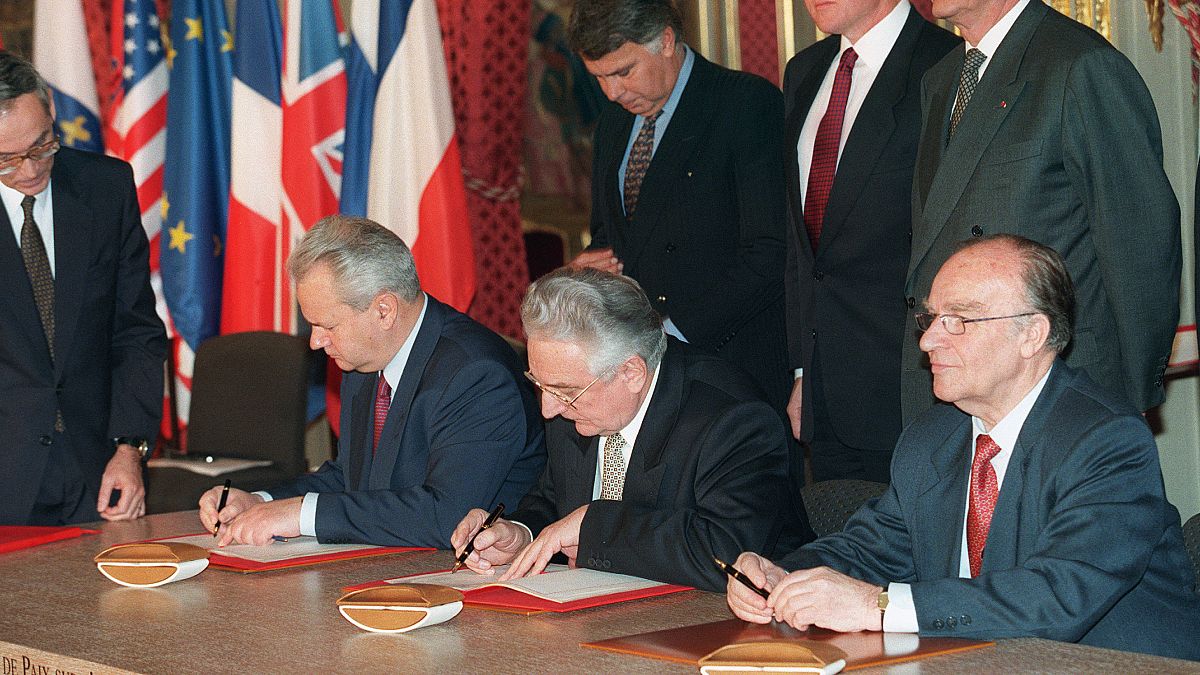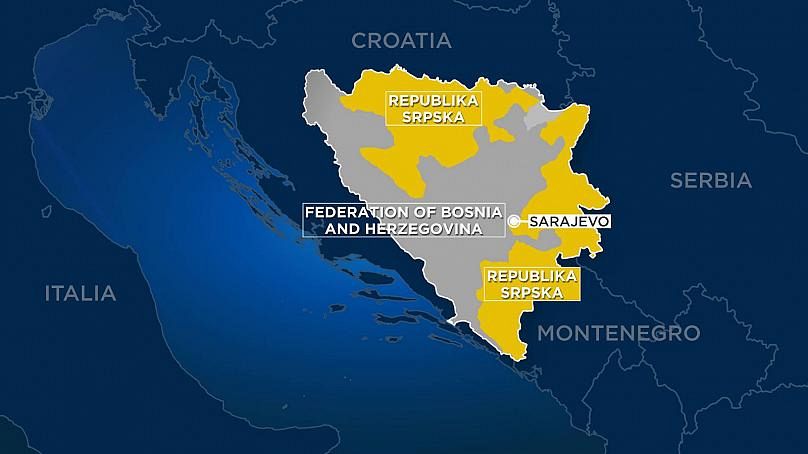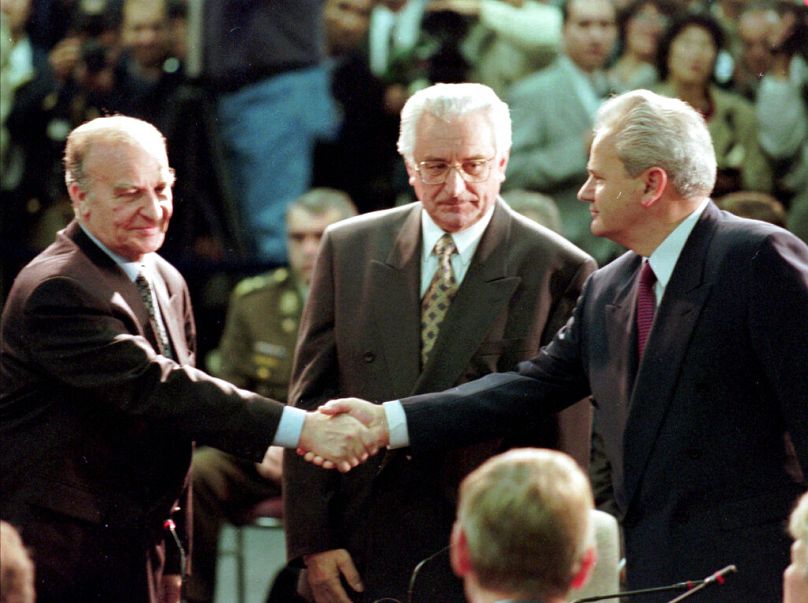The Dayton Agreement was a peace deal signed 25 years ago to end the 1992-1995 Bosnian War.
It's 25 years on from pen being formally put to paper to end a war that killed around 100,000 people and saw Europe's first genocide since World War II.
The 1992-95 conflict in Bosnia saw three main ethnic factions fight for control after the break-up of Yugoslavia.
The peace deal that ended it was initialled at a US airbase near Dayton, Ohio, before being signed in Paris on December 14, 1995.
The Dayton Agreement saw Bosnia's ethnic factions - Muslim Bosniaks, Catholic Croats and Orthodox Christian Serbs - agree to divide up the country.
The Federation of Bosnia and Herzegovina became home to the Muslim-majority Bosniaks and Croats. Then there is Republika Srpska, for the Serb population, which includes the part of Bosnia that borders Serbia.
The war saw around 100,000 people killed, most of them Bosniaks, and upward of 2 million, or in excess of half of Bosnia's population, driven from their homes.
Here Serbian journalist Milivoje Pantovic gives an account of how the Dayton Agreement was viewed a quarter of a century ago in Serbia, and how it's considered today:
On the eve of November 21, 1995, I was with my family celebrating the family's patron saint when peace was announced in Bosnia. Family and friends cheered while maps of each side’s territories were shown on national television. Everyone was pleased with the agreement. But there was also a dose of scepticism because it was not the first attempt at finding peace. The rest of the country felt the same way.
Years of Serbia’s involvement in what would today be called a "proxy war" in Bosnia and Herzegovina made even some hardliners cheer for peace.
But soon after the cheer came reflection and reconsideration. Questions ranged from "Did Serbs get enough?' to "Was it all worth it?"
In post-war Serbia, which would face another war a few years later with Kosovo after Kosovan separatists rebelled against Serbian rule (prompting Serb forces to launch a brutal crackdown) on its own territory, it was easy to shift the question to the right: "Could Serbs/Serbia get more?"
Years passed before people in Serbia - but also those in Republika Srpska, a smaller entity in the Federation of Bosnia and Herzegovina - changed their stance towards the Dayton Agreement. They went from criticising it to becoming its strongest supporters.
Even current president Aleksandar Vučić, who was a far-right nationalist during the nineties, changed his opinion and no longer calls the agreement "treason".
Bosnia and Herzegovina is ripe for fickleness. The fact that it is made up of three ethnic factions means, just as in George Orwell's book 1984, it is possible to create a new enemy and new alliances on an almost daily basis. The Dayton Agreement is no different.
In the Serbian village of Busije, about 20 minutes' drive from Belgrade, lies the biggest village of refugees from Croatia and Bosnia and Herzegovina. In one of the bars, I found Milan from Bosnia. Not keen on giving me his last name, he said he does not like the relatively new idea of a Dayton II (the idea of revisiting the peace deal and creating a more unified Bosnia) or changes imposed by the High Representative for Bosnia and Herzegovina, in the aftermath of the peace deal.
"We had our police, they had theirs," he told me. "We had our ministries, they had theirs. A lot was taken from Republika Srpska and given to the Federation [of Bosnia and Herzegovina]. That is not good," he said.
Milan was referring to the Peace Implementation Council, which in 1997 gave the High Representative for Bosnia and Herzegovina more powers. Some believe that diluted the powers of Republika Srpska.
But Dejan Kozul, a correspondent of Federal TV from Sarajevo, Bosnia, who now lives in Belgrade, told me that despite its flaws, the Dayton Agreement was and still is a frame to end the war.
"Graffiti in Sarajevo says: 'Just as long as there is no shooting'. That is Dayton, which stopped the war. Unfortunately, it did not stop the other kind of conflict".
He said war crimes stopped because of Dayton, but the mindset and the divisions that led to war in the first place are still present.
"The view on the agreement that ended the war is not only different in Serbia or Croatia but also in Bosnia and Herzegovina," added Kozul. "Serbs, Croats, and Bosniaks, they all see the Dayton Agreement differently in Bosnia. The Serbian side wants to 'bring it back' to its roots, while others think it needs to evolve".
Now 25 years on, people in Bosnia and neighbouring countries "deal" with Dayton in terms of who got more and how to interpret it, Kozul said, instead of dealing with real issues such as the environment, the youth leaving the country, high unemployment, and so on.
"That nationalist mantra from before the war is still very much alive," he said. "Corruption in all three countries that signed the treaty is destroying those countries and it is easier to focus on ethnic divisions and the agreement itself than to solve those problems".
Goran Tepšić, assistant professor at the Faculty of Political Science in Belgrade, told Euronews dismantling the agreement could cause massive shifts in the security of the region.
"Despite the Bosnian state being not fully functional, dismantling the agreement could lead to the further disintegration of Bosnia and Herzegovina," he added. "'Dayton Bosnia' has shown great resilience and ability to survive, so its future should not be questionable".
Every weekday at 1900 CET, Uncovering Europe brings you a European story that goes beyond the headlines. Download the Euronews app to get an alert for this and other breaking news. It's available on Apple and Android devices.


